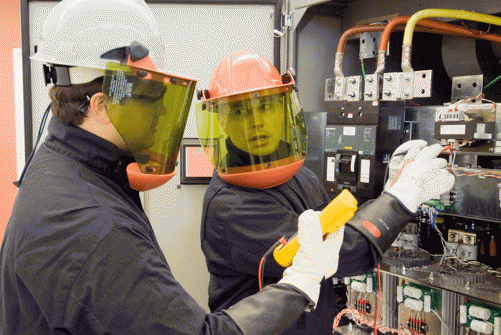
It is important to note that a person can be considered qualified with respect to certain equipment and methods, but still be unqualified in other situations.
Working with electrical power has always been a risky business, and potential hazards - including arc flash - are on the rise. Because of the severe and often devastating consequences of arc flash incidents (which claim at least one life every workday), the NFPA is using several strategies to facilitate worker safety starting with the requirement that workers be properly qualified for the work being performed.
The NFPA 70E 2018 definition of a qualified person is: "One who has demonstrated skills and knowledge related to the construction and operation of electrical equipment and installations and has received safety training to identify the hazards and reduce the associated risk.”
A qualified person has been trained and is knowledgeable in the construction and operation of equipment or a specific work method and be trained to identify and avoid the electrical hazards that might be present with respect to that equipment or work method.
Electrical workers who meet the definition of a “qualified electrical worker” will be able to:
- Determine the nominal voltage for the equipment or system
- Determine the required approach distances for electrical shock and burn hazards
- Distinguish exposed energized conductors and circuits from other parts of the equipment
- Properly select, care for and use the appropriate personal protective equipment for both shock protection and arc flash protection
Other safe work requirements
Being properly qualified is just one of the safe work strategies found in NFPA-70E. Other safe work requirements include performing work under an electrically safe work condition whenever it is feasible to do so, and following prescribed safe work practices when creating an electrically safe work condition is not feasible.
Prescribed safe work practices may include:
- Restricting access to energized electrical equipment with barricades and signs
- Establishing various approach boundaries
- Requiring specific PPE for electric shock and arc flash hazards, and job planning requirements, which include hazard analysis, job safety briefings and the use of energized work permits.
When is a qualified worker considered unqualified?
It is important to note that a person can be considered qualified with respect to certain equipment and methods, but still be unqualified in other situations. A person could be qualified to perform one work task and not be qualified to perform a different task on the same piece of equipment.
A qualified worker must understand the construction and operation of the equipment or circuit associated with the planned work task. Qualified workers should also recognize that new equipment, a different set of procedures, or the ability to perform a similar task may make them unqualified to perform a scheduled task on specific equipment.
It is crucial to acknowledge when a person may not be qualified for the task that they are assigned, and that a person could be qualified to work on one piece of equipment but not another similar piece of equipment. For example, a person could be competent to install a light fixture but not qualified under NFPA 70E to troubleshoot the same fixture while it is energized.
2015 Updates to NFPA 70E Qualified Person Requirements
The 2015 version of NFPA 70E adds the requirement that a qualified person shall demonstrate the ability to use the following:
- Special precautionary techniques
- PPE including arc flash suits
- Insulating and shielding materials
- Insulated tools and test equipment
The new standard also adds that qualified electrical workers permitted to work within the limited approach boundary of exposed energized electrical conductors and circuit parts must have additional training in minimum approach distances to exposed parts operating at 50 volts or more.
Employees who respond to medical emergencies must also participate in refresher training per the new standard.
Why NFPA 70E?
NFPA 70E is the standard that addresses employee workplace electrical safety requirements, focusing on practical safeguards that also allow workers to be productive within their job functions.
Although OSHA, ASTM, IEEE and other industry standards provide guidelines for performance, NFPA 70E specifically addresses work practices and is widely considered as the de-facto standard for Electrical Safety in the Workplace.
